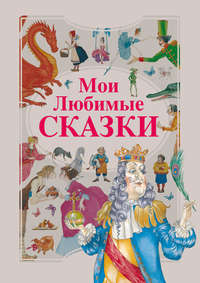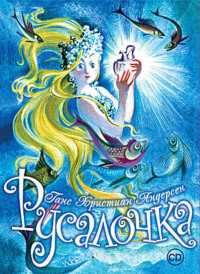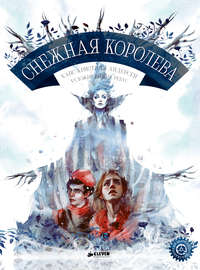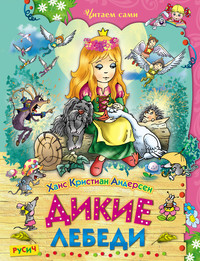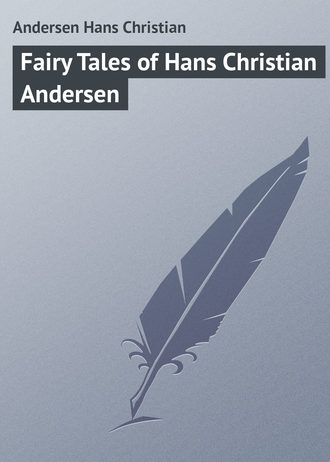 полная версия
полная версияFairy Tales of Hans Christian Andersen
"Poor little Ephemera!" said the oak; "what a terribly short life!" And so, on every summer day the dance was repeated, the same questions asked, and the same answers given. The same thing was continued through many generations of Ephemera; all of them felt equally merry and equally happy.
The oak remained awake through the morning of spring, the noon of summer, and the evening of autumn; its time of rest, its night drew nigh – winter was coming. Already the storms were singing, "Good-night, good-night." Here fell a leaf and there fell a leaf. "We will rock you and lull you. Go to sleep, go to sleep. We will sing you to sleep, and shake you to sleep, and it will do your old twigs good; they will even crackle with pleasure. Sleep sweetly, sleep sweetly, it is your three-hundred-and-sixty-fifth night. Correctly speaking, you are but a youngster in the world. Sleep sweetly, the clouds will drop snow upon you, which will be quite a cover-lid, warm and sheltering to your feet. Sweet sleep to you, and pleasant dreams." And there stood the oak, stripped of all its leaves, left to rest during the whole of a long winter, and to dream many dreams of events that had happened in its life, as in the dreams of men. The great tree had once been small; indeed, in its cradle it had been an acorn. According to human computation, it was now in the fourth century of its existence. It was the largest and best tree in the forest. Its summit towered above all the other trees, and could be seen far out at sea, so that it served as a landmark to the sailors. It had no idea how many eyes looked eagerly for it. In its topmost branches the wood-pigeon built her nest, and the cuckoo carried out his usual vocal performances, and his well-known notes echoed amid the boughs; and in autumn, when the leaves looked like beaten copper plates, the birds of passage would come and rest upon the branches before taking their flight across the sea. But now it was winter, the tree stood leafless, so that every one could see how crooked and bent were the branches that sprang forth from the trunk. Crows and rooks came by turns and sat on them, and talked of the hard times which were beginning, and how difficult it was in winter to obtain food.
It was just about holy Christmas time that the tree dreamed a dream. The tree had, doubtless, a kind of feeling that the festive time had arrived, and in his dream fancied he heard the bells ringing from all the churches round, and yet it seemed to him to be a beautiful summer's day, mild and warm. His mighty summits was crowned with spreading fresh green foliage; the sunbeams played among the leaves and branches, and the air was full of fragrance from herb and blossom; painted butterflies chased each other; the summer flies danced around him, as if the world had been created merely for them to dance and be merry in. All that had happened to the tree during every year of his life seemed to pass before him, as in a festive procession. He saw the knights of olden times and noble ladies ride by through the wood on their gallant steeds, with plumes waving in their hats, and falcons on their wrists. The hunting horn sounded, and the dogs barked. He saw hostile warriors, in colored dresses and glittering armor, with spear and halberd, pitching their tents, and anon striking them. The watchfires again blazed, and men sang and slept under the hospitable shelter of the tree. He saw lovers meet in quiet happiness near him in the moonshine, and carve the initials of their names in the grayish-green bark on his trunk. Once, but long years had intervened since then, guitars and Eolian harps had been hung on his boughs by merry travellers; now they seemed to hang there again, and he could hear their marvellous tones. The wood-pigeons cooed as if to explain the feelings of the tree, and the cuckoo called out to tell him how many summer days he had yet to live. Then it seemed as if new life was thrilling through every fibre of root and stem and leaf, rising even to the highest branches. The tree felt itself stretching and spreading out, while through the root beneath the earth ran the warm vigor of life. As he grew higher and still higher, with increased strength, his topmost boughs became broader and fuller; and in proportion to his growth, so was his self-satisfaction increased, and with it arose a joyous longing to grow higher and higher, to reach even to the warm, bright sun itself. Already had his topmost branches pierced the clouds, which floated beneath them like troops of birds of passage, or large white swans; every leaf seemed gifted with sight, as if it possessed eyes to see. The stars became visible in broad daylight, large and sparkling, like clear and gentle eyes. They recalled to the memory the well-known look in the eyes of a child, or in the eyes of lovers who had once met beneath the branches of the old oak. These were wonderful and happy moments for the old tree, full of peace and joy; and yet, amidst all this happiness, the tree felt a yearning, longing desire that all the other trees, bushes, herbs, and flowers beneath him, might be able also to rise higher, as he had done, and to see all this splendor, and experience the same happiness. The grand, majestic oak could not be quite happy in the midst of his enjoyment, while all the rest, both great and small, were not with him. And this feeling of yearning trembled through every branch, through every leaf, as warmly and fervently as if they had been the fibres of a human heart. The summit of the tree waved to and fro, and bent downwards as if in his silent longing he sought for something. Then there came to him the fragrance of thyme, followed by the more powerful scent of honeysuckle and violets; and he fancied he heard the note of the cuckoo. At length his longing was satisfied. Up through the clouds came the green summits of the forest trees, and beneath him, the oak saw them rising, and growing higher and higher. Bush and herb shot upward, and some even tore themselves up by the roots to rise more quickly. The birch-tree was the quickest of all. Like a lightning flash the slender stem shot upwards in a zigzag line, the branches spreading around it like green gauze and banners. Every native of the wood, even to the brown and feathery rushes, grew with the rest, while the birds ascended with the melody of song. On a blade of grass, that fluttered in the air like a long, green ribbon, sat a grasshopper, cleaning his wings with his legs. May beetles hummed, the bees murmured, the birds sang, each in his own way; the air was filled with the sounds of song and gladness.
"But where is the little blue flower that grows by the water?" asked the oak, "and the purple bell-flower, and the daisy?" You see the oak wanted to have them all with him.
"Here we are, we are here," sounded in voice and song.
"But the beautiful thyme of last summer, where is that? and the lilies-of-the-valley, which last year covered the earth with their bloom? and the wild apple-tree with its lovely blossoms, and all the glory of the wood, which has flourished year after year? even what may have but now sprouted forth could be with us here."
"We are here, we are here," sounded voices higher in the air, as if they had flown there beforehand.
"Why this is beautiful, too beautiful to be believed," said the oak in a joyful tone. "I have them all here, both great and small; not one has been forgotten. Can such happiness be imagined?" It seemed almost impossible.
"In heaven with the Eternal God, it can be imagined, and it is possible," sounded the reply through the air.
And the old tree, as it still grew upwards and onwards, felt that his roots were loosening themselves from the earth.
"It is right so, it is best," said the tree, "no fetters hold me now. I can fly up to the very highest point in light and glory. And all I love are with me, both small and great. All – all are here."
Such was the dream of the old oak: and while he dreamed, a mighty storm came rushing over land and sea, at the holy Christmas time. The sea rolled in great billows towards the shore. There was a cracking and crushing heard in the tree. The root was torn from the ground just at the moment when in his dream he fancied it was being loosened from the earth. He fell – his three hundred and sixty-five years were passed as the single day of the Ephemera. On the morning of Christmas-day, when the sun rose, the storm had ceased. From all the churches sounded the festive bells, and from every hearth, even of the smallest hut, rose the smoke into the blue sky, like the smoke from the festive thank-offerings on the Druids' altars. The sea gradually became calm, and on board a great ship that had withstood the tempest during the night, all the flags were displayed, as a token of joy and festivity. "The tree is down! The old oak, – our landmark on the coast!" exclaimed the sailors. "It must have fallen in the storm of last night. Who can replace it? Alas! no one." This was a funeral oration over the old tree; short, but well-meant. There it lay stretched on the snow-covered shore, and over it sounded the notes of a song from the ship – a song of Christmas joy, and of the redemption of the soul of man, and of eternal life through Christ's atoning blood.
"Sing aloud on the happy morn,All is fulfilled, for Christ is born;With songs of joy let us loudly sing,'Hallelujahs to Christ our King.'"Thus sounded the old Christmas carol, and every one on board the ship felt his thoughts elevated, through the song and the prayer, even as the old tree had felt lifted up in its last, its beautiful dream on that Christmas morn.
THE LAST PEARL
We are in a rich, happy house, where the master, the servants, the friends of the family are full of joy and felicity. For on this day a son and heir has been born, and mother and child are doing well. The lamp in the bed-chamber had been partly shaded, and the windows were covered with heavy curtains of some costly silken material. The carpet was thick and soft, like a covering of moss. Everything invited to slumber, everything had a charming look of repose; and so the nurse had discovered, for she slept; and well she might sleep, while everything around her told of happiness and blessing. The guardian angel of the house leaned against the head of the bed; while over the child was spread, as it were, a net of shining stars, and each star was a pearl of happiness. All the good stars of life had brought their gifts to the newly born; here sparkled health, wealth, fortune, and love; in short, there seemed to be everything for which man could wish on earth.
"Everything has been bestowed here," said the guardian angel.
"No, not everything," said a voice near him – the voice of the good angel of the child; "one fairy has not yet brought her gift, but she will, even if years should elapse, she will bring her gift; it is the last pearl that is wanting."
"Wanting!" cried the guardian angel; "nothing must be wanting here; and if it is so, let us fetch it; let us seek the powerful fairy; let us go to her."
"She will come, she will come some day unsought!"
"Her pearl must not be missing; it must be there, that the crown, when worn, may be complete. Where is she to be found? Where does she dwell?" said the guardian angel. "Tell me, and I will procure the pearl."
"Will you do that?" replied the good angel of the child. "Then I will lead you to her directly, wherever she may be. She has no abiding place; she rules in the palace of the emperor, sometimes she enters the peasant's humble cot; she passes no one without leaving a trace of her presence. She brings her gift with her, whether it is a world or a bauble. To this child she must come. You think that to wait for this time would be long and useless. Well, then, let us go for this pearl – the only one lacking amidst all this wealth."
Then hand-in-hand they floated away to the spot where the fairy was now lingering. It was in a large house with dark windows and empty rooms, in which a peculiar stillness reigned. A whole row of windows stood open, so that the rude wind could enter at its pleasure, and the long white curtains waved to and fro in the current of air. In the centre of one of the rooms stood an open coffin, in which lay the body of a woman, still in the bloom of youth and very beautiful. Fresh roses were scattered over her. The delicate folded hands and the noble face glorified in death by the solemn, earnest look, which spoke of an entrance into a better world, were alone visible. Around the coffin stood the husband and children, a whole troop, the youngest in the father's arms. They were come to take a last farewell look of their mother. The husband kissed her hand, which now lay like a withered leaf, but which a short time before had been diligently employed in deeds of love for them all. Tears of sorrow rolled down their cheeks, and fell in heavy drops on the floor, but not a word was spoken. The silence which reigned here expressed a world of grief. With silent steps, still sobbing, they left the room. A burning light remained in the room, and a long, red wick rose far above the flame, which fluttered in the draught of air. Strange men came in and placed the lid of the coffin over the dead, and drove the nails firmly in; while the blows of the hammer resounded through the house, and echoed in the hearts that were bleeding.
"Whither art thou leading me?" asked the guardian angel. "Here dwells no fairy whose pearl could be counted amongst the best gifts of life."
"Yes, she is here; here in this sacred hour," replied the angel, pointing to a corner of the room; and there, – where in her life-time, the mother had taken her seat amidst flowers and pictures: in that spot, where she, like the blessed fairy of the house, had welcomed husband, children, and friends, and, like a sunbeam, had spread joy and cheerfulness around her, the centre and heart of them all, – there, in that very spot, sat a strange woman, clothed in long, flowing garments, and occupying the place of the dead wife and mother. It was the fairy, and her name was "Sorrow." A hot tear rolled into her lap, and formed itself into a pearl, glowing with all the colors of the rainbow. The angel seized it: the pearl glittered like a star with seven-fold radiance. The pearl of Sorrow, the last, which must not be wanting, increases the lustre, and explains the meaning of all the other pearls.
"Do you see the shimmer of the rainbow, which unites earth to heaven?" So has there been a bridge built between this world and the next. Through the night of the grave we gaze upwards beyond the stars to the end of all things. Then we glance at the pearl of Sorrow, in which are concealed the wings which shall carry us away to eternal happiness.
LITTLE CLAUS AND BIG CLAUS
In a village there once lived two men who had the same name. They were both called Claus. One of them had four horses, but the other had only one; so to distinguish them, people called the owner of the four horses, "Great Claus," and he who had only one, "Little Claus." Now we shall hear what happened to them, for this is a true story.
Through the whole week, Little Claus was obliged to plough for Great Claus, and lend him his one horse; and once a week, on a Sunday, Great Claus lent him all his four horses. Then how Little Claus would smack his whip over all five horses, they were as good as his own on that one day. The sun shone brightly, and the church bells were ringing merrily as the people passed by, dressed in their best clothes, with their prayer-books under their arms. They were going to hear the clergyman preach. They looked at Little Claus ploughing with his five horses, and he was so proud that he smacked his whip, and said, "Gee-up, my five horses."
"You must not say that," said Big Claus; "for only one of them belongs to you." But Little Claus soon forgot what he ought to say, and when any one passed he would call out, "Gee-up, my five horses!"
"Now I must beg you not to say that again," said Big Claus; "for if you do, I shall hit your horse on the head, so that he will drop dead on the spot, and there will be an end of him."
"I promise you I will not say it any more," said the other; but as soon as people came by, nodding to him, and wishing him "Good day," he became so pleased, and thought how grand it looked to have five horses ploughing in his field, that he cried out again, "Gee-up, all my horses!"
"I'll gee-up your horses for you," said Big Claus; and seizing a hammer, he struck the one horse of Little Claus on the head, and he fell dead instantly.
"Oh, now I have no horse at all," said Little Claus, weeping. But after a while he took off the dead horse's skin, and hung the hide to dry in the wind. Then he put the dry skin into a bag, and, placing it over his shoulder, went out into the next town to sell the horse's skin. He had a very long way to go, and had to pass through a dark, gloomy forest. Presently a storm arose, and he lost his way, and before he discovered the right path, evening came on, and it was still a long way to the town, and too far to return home before night. Near the road stood a large farmhouse. The shutters outside the windows were closed, but lights shone through the crevices at the top. "I might get permission to stay here for the night," thought Little Claus; so he went up to the door and knocked. The farmer's wife opened the door; but when she heard what he wanted, she told him to go away, as her husband would not allow her to admit strangers. "Then I shall be obliged to lie out here," said Little Claus to himself, as the farmer's wife shut the door in his face. Near to the farmhouse stood a large haystack, and between it and the house was a small shed, with a thatched roof. "I can lie up there," said Little Claus, as he saw the roof; "it will make a famous bed, but I hope the stork will not fly down and bite my legs;" for on it stood a living stork, whose nest was in the roof. So Little Claus climbed to the roof of the shed, and while he turned himself to get comfortable, he discovered that the wooden shutters, which were closed, did not reach to the tops of the windows of the farmhouse, so that he could see into a room, in which a large table was laid out with wine, roast meat, and a splendid fish. The farmer's wife and the sexton were sitting at the table together; and she filled his glass, and helped him plenteously to fish, which appeared to be his favorite dish. "If I could only get some, too," thought Little Claus; and then, as he stretched his neck towards the window he spied a large, beautiful pie, – indeed they had a glorious feast before them.
At this moment he heard some one riding down the road, towards the farmhouse. It was the farmer returning home. He was a good man, but still he had a very strange prejudice, – he could not bear the sight of a sexton. If one appeared before him, he would put himself in a terrible rage. In consequence of this dislike, the sexton had gone to visit the farmer's wife during her husband's absence from home, and the good woman had placed before him the best she had in the house to eat. When she heard the farmer coming she was frightened, and begged the sexton to hide himself in a large empty chest that stood in the room. He did so, for he knew her husband could not endure the sight of a sexton. The woman then quickly put away the wine, and hid all the rest of the nice things in the oven; for if her husband had seen them he would have asked what they were brought out for.
"Oh, dear," sighed Little Claus from the top of the shed, as he saw all the good things disappear.
"Is any one up there?" asked the farmer, looking up and discovering Little Claus. "Why are you lying up there? Come down, and come into the house with me." So Little Claus came down and told the farmer how he had lost his way and begged for a night's lodging.
"All right," said the farmer; "but we must have something to eat first."
The woman received them both very kindly, laid the cloth on a large table, and placed before them a dish of porridge. The farmer was very hungry, and ate his porridge with a good appetite, but Little Claus could not help thinking of the nice roast meat, fish and pies, which he knew were in the oven. Under the table, at his feet, lay the sack containing the horse's skin, which he intended to sell at the next town. Now Little Claus did not relish the porridge at all, so he trod with his foot on the sack under the table, and the dry skin squeaked quite loud. "Hush!" said Little Claus to his sack, at the same time treading upon it again, till it squeaked louder than before.
"Hallo! what have you got in your sack!" asked the farmer.
"Oh, it is a conjuror," said Little Claus; "and he says we need not eat porridge, for he has conjured the oven full of roast meat, fish, and pie."
"Wonderful!" cried the farmer, starting up and opening the oven door; and there lay all the nice things hidden by the farmer's wife, but which he supposed had been conjured there by the wizard under the table. The woman dared not say anything; so she placed the things before them, and they both ate of the fish, the meat, and the pastry.
Then Little Claus trod again upon his sack, and it squeaked as before. "What does he say now?" asked the farmer.
"He says," replied Little Claus, "that there are three bottles of wine for us, standing in the corner, by the oven."
So the woman was obliged to bring out the wine also, which she had hidden, and the farmer drank it till he became quite merry. He would have liked such a conjuror as Little Claus carried in his sack. "Could he conjure up the evil one?" asked the farmer. "I should like to see him now, while I am so merry."
"Oh, yes!" replied Little Claus, "my conjuror can do anything I ask him, – can you not?" he asked, treading at the same time on the sack till it squeaked. "Do you hear? he answers 'Yes,' but he fears that we shall not like to look at him."
"Oh, I am not afraid. What will he be like?"
"Well, he is very much like a sexton."
"Ha!" said the farmer, "then he must be ugly. Do you know I cannot endure the sight of a sexton. However, that doesn't matter, I shall know who it is; so I shall not mind. Now then, I have got up my courage, but don't let him come too near me."
"Stop, I must ask the conjuror," said Little Claus; so he trod on the bag, and stooped his ear down to listen.
"What does he say?"
"He says that you must go and open that large chest which stands in the corner, and you will see the evil one crouching down inside; but you must hold the lid firmly, that he may not slip out."
"Will you come and help me hold it?" said the farmer, going towards the chest in which his wife had hidden the sexton, who now lay inside, very much frightened. The farmer opened the lid a very little way, and peeped in.
"Oh," cried he, springing backwards, "I saw him, and he is exactly like our sexton. How dreadful it is!" So after that he was obliged to drink again, and they sat and drank till far into the night.
"You must sell your conjuror to me," said the farmer; "ask as much as you like, I will pay it; indeed I would give you directly a whole bushel of gold."
"No, indeed, I cannot," said Little Claus; "only think how much profit I could make out of this conjuror."
"But I should like to have him," said the fanner, still continuing his entreaties.
"Well," said Little Claus at length, "you have been so good as to give me a night's lodging, I will not refuse you; you shall have the conjuror for a bushel of money, but I will have quite full measure."
"So you shall," said the farmer; "but you must take away the chest as well. I would not have it in the house another hour; there is no knowing if he may not be still there."
So Little Claus gave the farmer the sack containing the dried horse's skin, and received in exchange a bushel of money – full measure. The farmer also gave him a wheelbarrow on which to carry away the chest and the gold.
"Farewell," said Little Claus, as he went off with his money and the great chest, in which the sexton lay still concealed. On one side of the forest was a broad, deep river, the water flowed so rapidly that very few were able to swim against the stream. A new bridge had lately been built across it, and in the middle of this bridge Little Claus stopped, and said, loud enough to be heard by the sexton, "Now what shall I do with this stupid chest; it is as heavy as if it were full of stones: I shall be tired if I roll it any farther, so I may as well throw it in the river; if it swims after me to my house, well and good, and if not, it will not much matter."


